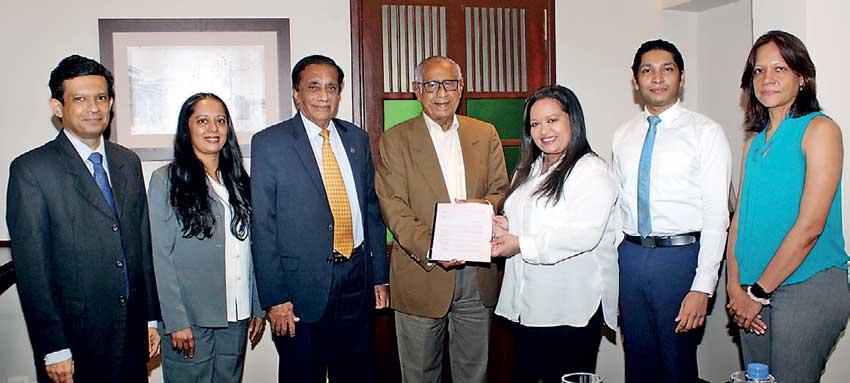22 Jan 2022 - {{hitsCtrl.values.hits}}

From left: COSMI Consultant Projects Samantha Abeywickrama, COSMI Secretary General Nilu Rajapakse, COSMI President Nawaz Rajabdeen, COSMI Governing Council Chairman Deshabandu Macky Hashim, CIPE Sri Lanka Country Representative Sarrah Sammoon, Verité Research Assistant Manager Navvid Mushin and Paramjit Kaur
The Confederation of Micro, Small and Medium Industries (COSMI) and Centre for International Private Enterprise (CIPE) entered into a memorandum of understanding (MoU) to assist the communities affected by large-scale infrastructure projects in Sri Lanka.
The agreement would help create an important public discourse, bringing in bottom-up insight into the impact of many large-scale infrastructure projects, COSMI Chairman Macky Hashim said.
With the assistance from the CIPE, which will be extended by way of knowledge, skills and network, CIPE Country Representative Sarrah Sammoon said the COSMI would be able to effectively engage in large-scale infrastructure projects and pilot initiatives to encourage the principles of participatory governance.
The COSMI is addressing two large-scale infrastructure development projects that are currently being implemented in the Anuradhapura and Hambantota districts.
The objective of the advocacy effort is to ensure that public expenditures on selected large-scale infrastructure projects reflect public interest and reinforce the principles of participatory governance.
In the Hambantota district, the highway development project resulted in the economic displacement of the traditional ‘dodol’ making community in Hambantota. In Anuradhapura, the farmers face displacement from their traditional farming lands, due to the ‘Wav Gam Pubuduwa’ project.
The COSMI-CIPE partnership aims to find and settle in suitable alternate markets and lands for the two impacted communities.
The project also aims to develop and secure markets for the produce of the community, while ensuring legal ownership of their livelihood practises.
The rationale behind the selection of the two specific projects is in line with the overall socio-economic context of the respective districts and future development plans envisaged for the two districts, the COSMI said in a statement to the media.
The project proposes an integrated multi-stakeholder engagement strategy, which is the key behind the implementation methodology of the project.
It is expected that the project will result in greater community awareness and engagement, transparency in terms of overall resource management, reduce adverse impact on the communities and environment and create a sustainable engagement mechanism for project-related matters for the future.
26 Apr 2024 5 hours ago
26 Apr 2024 6 hours ago
26 Apr 2024 8 hours ago
26 Apr 2024 8 hours ago
26 Apr 2024 9 hours ago